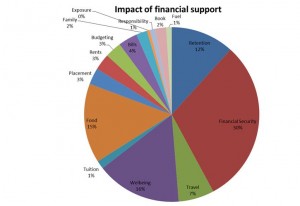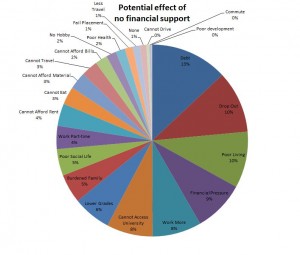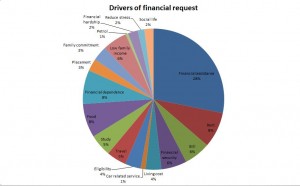Bournemouth University’s Fair Access Agreement Management Group recently commissioned a study to investigate the impact of BU administered financial supports/bursaries on student success, retention, well-being, as well as employability. The different bursary types investigated include Maintenance Bursary, Hardship Fund and Care Leavers Bursary.
Institutional financial supports to students who may be from low income households or experiencing some financial hardship could be said to possess the propensity to enable them to participate in higher education on a somewhat equal basis like their affluent peers (McCaig et al., 2016). The question as to whether these bursaries are serving the intended purpose of widening opportunities for higher education access, retention and success needs a close examination. A literature review commission by the UK’s Office for Fair Access (OFFA) on the impact of institutional bursaries or financial support on access to higher education depicts that although some students felt that financial support impacted on their decision for higher education enrolment and choice of university, it wasn’t the most significant determinant (Nursaw Associates, 2015). A range of other factors can play a significant part not only as key determinants of student enrolment in higher education but can increase the impact of financial supports (Thomas, 2015). This is corroborated by a report from a study carried out by Bowes et al. (2014) which suggests that the extent to which financial supports or bursaries can make a difference is often determined by other dynamics such as the relevance of the programme of study, its likelihood of leading to a job, the geographical location of the institution and perhaps the possibility of attending university from home. Whilst it can be said that institutional financial supports have the potential to impact on a student’s choice of university, retention, wellbeing and success, there is limited research that addresses how this potential can be maximised in conjunction with other variables (Nursaw Associates, 2015). The intricacies surrounding the optimisation of the impact of institutional financial supports on student’s decision for university study, success or retention needs to be fully understood so that a university’s investment in providing financial bursaries to students can demonstrate the desirable returns. In this light, the project examines what differences financial supports made in widening higher educational opportunities for students with respect to access, retention, wellbeing and success.
An instrumental case study was adopted for the project. This is because this type of approach has been shown to help understanding of a broader subject (Yin, 2013) such as the impact of institutional financial support on students accessing and succeeding in Higher Education. In order to deliver a comprehensive data for a reliable outcome, a mixed methods approach was used comprising of qualitative and quantitative methods. A reviewed commission by OFFA asserts that institutions that have used a mixed methods approach to ascertain the impact of their financial support had a rich source of information that can enable a better understanding (Nursaw Associates, 2015). In the case of the project, instruments of the mixed methods approach consist of an online Bristol Survey (BOS) and in-depth semi-structured interviews (Stake, 1994; Yin, 2013) as well as focus groups. The survey was adapted from a common set of measures and survey tool for universities and colleges to use when collecting data and reporting on the impact of financial supports on students’ success and wellbeing. This common tool which is currently in use by five universities was prepared by a project commissioned by OFFA in June 2015. The cohorts of students recruited for the study are from the 2012/13, 2013/14, 2014/2015 and 2015/2016 academic years, each student beneficiary of a university bursary was invited to complete the electronic survey and more than 600 responded.
The survey captured a broad range of data including open ended text responses which are rich in content. The in-depth qualitative data embedded in the survey is currently being analysed thematically (Boyatzis, 1998) and the following emerging findings which form part of this snapshot progress report can be advanced:
Out of the several responses on reasons for requesting financial support, the most recurrent theme was the need for financial assistance. However, many of the students went on identify more specific motives for requesting financial assistance such as low family income and the need to afford food, rents or pay bills as illustrated below:
The following quotations from some participants illustrate some of the reasons for seeking financial assistance:
“My families income is very low and if I needed help with financing, there was no way they could help unless it would have resulted in financial difficulties for them”
“My family is just myself and my mum. I don’t want to always ask her for money I want to be independent but university is very expensive with bills, food and petrol”
“Going to university was a big decision and I was very worried about my financial situation. My girlfriend showed me the support available so it became a key factor in going to uni”
“I applied for the bursary as I wanted to be able to completely focus on my studies “
Whilst participants had different motives for requesting financial support, it was needful to investigate the actual impact financial support or bursary had on their studies or university life. In this light and when asked to state how the financial support or bursary helped them, the most recurrent them was financial security as evident below:

According to several of the respondents, financial aid from the university enabled them to be financially secured. That is, they could focus on their studies without the worry and stress that comes with inability to pay rents or bills. The following excepts from students’ responses illustrate some of the impacts of receiving financial supports:
Access
“Without it I couldn’t go to uni”
“Without this bursary I would not have been able to attend university”
Financial security:
“It was very helpful in terms that I knew I will have food in my fridge every month to feed my child and myself. Gave me a sense of security”
“Just got rid of the constant worrying”
“Helped to reduce stress caused by over working or worrying about money issues”
“General peace of mind that I can live to a decent standard. It has been so helpful to me”
Retention
“I would probably have had to leave uni and consider full time work to survive. I really appreciate the bursary and scholarship I received, it’s the only reason I’m able to complete the year. Thank you”
“Was essential in helping me to continue my course”
“Allowed me to concentrate on my education and degree, provided ease and reassurance towards my finances. I genuinely do not know how i would of coped had the fund not have been available. I can not express my gratitude enough”
“It helped me to be able to afford to continue my studies”
Success
“It meant I could spend more time studying instead of working, which has helped me achieve a first overall last semester”
“It took a massive burden away from me and allowed me to put everything I could into my studies and getting the best possible grades for myself”
Wellbeing:
“It has made my university time more pleasant”
“It allowed me to participate in all aspects of university life, particularly the sporting side”
“Helped me make a good group of friends as I could afford to socialise in freshers week and onward”
“It has allowed me to enjoy student life, and enjoy time with my friends”
“I have also been able to carry on with my hobbies and interests”
In addition to the lines of inquiry already mentioned, respondents were asked what would have happened if they had not been provided financial support. Although this question is similar to a previous one, it provided an opportunity to test the validity of some initial responses. In this case, a majority of the participants suggested that if they had not received financial support, they would have incurred debt and this was followed closely by a significant number who asserted they would have dropped out as illustrated in the following pie chart:

In the findings above, the most recurrent themes are co-related. That is, it can be maintained that the need for financial assistance as a motivating factor for students requesting support is directly related to having financial security if provided with the relevant support. Furthermore, students’ lack of financial security could lead to them incurring debts which could have adverse repercussions on their studies. In summary, the preliminary findings convey in this brief suggest that BU financial supports/bursaries are having a positive effect in the lives of students and in some cases, their loved ones as well. The following respond from a participant highlights some profound impacts of BU bursaries:
“I was able to purchase food without worrying about going over my overdraft. For this time last year, I had the support of the bursary fund, and this year the support of the hardship fund. I have been able to focus (during those times) much more with my studies and it has helped me feel more comfortable staying in university as a student to complete my studies, with less worries regarding my financial difficulties (although, they still co-exist, the support of BU significantly has reduced them at the time of assistance). I am and will be forever grateful for all the support given to me by the university to help me in such difficult times I have experienced financially”
The final report of this interesting study will be available at the end of the project but should you want to contact the investigators, please email Marcellus Mbah or Debbie Holley.
References:
Bowes, L., Moreton, R., Thomas, L., Porter, A., Sheen, J., Birkin, G. (2014) National Scholarship Programme – Year 3. Report to HEFCE by CFE Research and Edge Hill University. Leicester: CFE Research
Boyatzis, R.E., (1998). Transforming qualitative information: Thematic analysis and code development. Sage.
McCaig et al. (2016) Understanding the impact of institutional financial support on student success: Phase One Report. Available at: http://www.shu.ac.uk/research/ceir/sites/ceir/files/OFFA%20Financial%20support%20phase%20one%20report%20Feb%202016.pdf (accessed on 22/04/2016)
Nursaw Associates (2015) What do we know about the impact of financial support on access and student success? OFFA, April 2015
Stake, R.E., (1994). Case studies. InN. K. Denzin & YS Lincoln (Eds.), Handbook of qualitative research (pp. 236-247).
Thomas, L. (2015) Editorial. Widening Participation and Lifelong Learning, Volume 17, Number 3, October 2015, pp. 5-16
Yin, R. K., (2013). Case study research: Design and methods. Sage publications.








